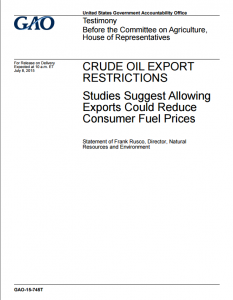Full Title: Crude Oil Export Restrictions: Studies Suggest Allowing Exports Could Reduce Consumer Fuel Prices
Author(s): U.S. Government Accountability Office
Publisher(s): U.S. Government Accountability Office
Publication Date: July 1, 2015
Full Text: Download Resource
Description (excerpt):
In September 2014, GAO reported that according to studies it reviewed and stakeholders it interviewed, removing crude oil export restrictions would likely increase domestic crude oil prices, but could decrease consumer fuel prices, although the extent of price changes are uncertain and may vary by region. The studies identified the following implications for U.S. crude oil and consumer fuel prices:
1.) Crude oil prices. The four studies GAO reviewed estimated that if crude oil export restrictions were removed, U.S. crude oil prices would increase by about $2 to $8 per barrel—bringing them closer to international prices. Prices for some U.S. crude oils have been lower than international prices—for example, one benchmark U.S. crude oil averaged $52 per barrel from January through May 2015, while a comparable international crude oil averaged $57. In addition, one study found that, when assuming low future crude oil prices overall, removing export restrictions would have no measurable effect on U.S. crude oil prices.
2.) Consumer fuel prices. The four studies suggested that U.S. prices for gasoline, diesel, and other consumer fuels follow international prices. If domestic crude oil exports caused international crude oil prices to decrease, consumer fuel prices could decrease as well. Estimates of the consumer fuel price implications in the four studies GAO reviewed ranged from a decrease of 1.5 to 13 cents per gallon. In addition, one study found that, when assuming low future crude oil prices, removing export restrictions would have no measurable effect on consumer fuel prices.
Some stakeholders cautioned that estimates of the price implications of removing export restrictions are subject to several uncertainties, such as the extent of U.S. crude oil production increases, and how readily U.S. refiners are able to absorb such increases. Some stakeholders further told GAO that there could be important regional differences in the price implications of removing export restrictions.
The studies GAO reviewed and the stakeholders it interviewed generally suggested that removing crude oil export restrictions may also have the following implications:
1.) Crude oil production. Removing export restrictions may increase domestic production—over 8 million barrels per day in 2014—because of increasing domestic crude oil prices. Estimates ranged from an additional 130,000 to 3.3 million barrels per day on average from 2015 through 2035.
2.) Environment. Additional crude oil production may pose risks to the quality and quantity of surface groundwater sources; increase greenhouse gas and other emissions; and increase the risk of spills from crude oil transportation.
3.) The economy. Three of the studies projected that removing export restrictions would lead to additional investment in crude oil production and increases in employment. This growth in the oil sector would—in turn—have additional positive effects in the rest of the economy, including for employment and government revenues.
